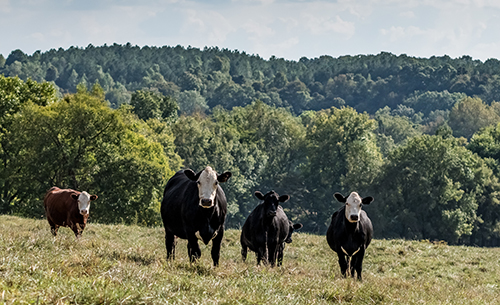July is Beef Month
Jul 05, 2022

July is Beef Month in Tennessee, and as we celebrate, I am reminded of the significant impact of beef cattle on our state’s economy. According to the Tennessee Department of Agriculture (TDA), beef cattle are consistently among the top three of Tennessee's farming commodities, accounting for 16.7% of all agriculture cash receipts. Furthermore, Tennessee is home to more than 45,000 operations and 2 million cattle.
Tennessee can be proud of its beef cattle heritage and the great influence institutions like Co-op, Tennessee Farm Bureau (TFBF), Tennessee Cattleman’s Association, Tennessee Department of Agriculture (TDA), and the University of Tennessee (UT) Extension Service have on producer education and research. The UT Extension Service has long been a vital partner in beef cattle development and continues to provide cutting-edge research to the benefit of producers. UT’s Bull Development and Evaluation Program, Tennessee Beef Heifer Development Program, and Tennessee Master Beef Producer Program are examples of the valuable resources available for all Tennessee cattle producers.
Co-op cattle minerals were developed and enhanced based on forage mineral research conducted by the University of Tennessee. This research provided up-to-date information relating to nutritional composition contained in Southeast forages, and Co-op was able to work within its network to match cattle minerals to these research results.
Along with TFBF and TDA, Co-op worked in conjunction with UT Extension to make the Heifer Development Center a reality some years ago. Today, that facility continues to provide better ways to develop replacement beef heifers.
Tennessee has seen impressive results from TDA’s Ag Enhancement program, which, from its beginning, included beef genetics as part of the offering. This program has been responsible for great strides in the quality of Tennessee calves.
The best part of beef cattle farming is, without a doubt, the production of a healthy food choice for consumers. According to the Beef Industry Council, beef gives the taste you love while providing the necessary elements for our bodies to function. Protein helps preserve and build muscle. Selenium protects cells from damage. Zinc maintains a healthy immune system. Niacin supports energy production and metabolism. Vitamins B6 and B12 support brain function and increase energy. Phosphorous builds bones and teeth. Choline supports nervous system development. Iron helps your body use oxygen, and Riboflavin converts food into fuel.
Co-op has always been a supporter of the beef industry, providing quality products for producers to feed and manage cattle. We understand that beef is food and therefore take food safety seriously. Each Co-op feed plant is certified Safe Feed/Safe Food and meets all food safety regulations. Our beef feed products are safe for both the animal and the ultimate consumer.
Celebrating beef in July is certainly a great way to recognize an industry that provides such significant value to the economy, our way of life, and our health.
Tennessee can be proud of its beef cattle heritage and the great influence institutions like Co-op, Tennessee Farm Bureau (TFBF), Tennessee Cattleman’s Association, Tennessee Department of Agriculture (TDA), and the University of Tennessee (UT) Extension Service have on producer education and research. The UT Extension Service has long been a vital partner in beef cattle development and continues to provide cutting-edge research to the benefit of producers. UT’s Bull Development and Evaluation Program, Tennessee Beef Heifer Development Program, and Tennessee Master Beef Producer Program are examples of the valuable resources available for all Tennessee cattle producers.
Co-op cattle minerals were developed and enhanced based on forage mineral research conducted by the University of Tennessee. This research provided up-to-date information relating to nutritional composition contained in Southeast forages, and Co-op was able to work within its network to match cattle minerals to these research results.
Along with TFBF and TDA, Co-op worked in conjunction with UT Extension to make the Heifer Development Center a reality some years ago. Today, that facility continues to provide better ways to develop replacement beef heifers.
Tennessee has seen impressive results from TDA’s Ag Enhancement program, which, from its beginning, included beef genetics as part of the offering. This program has been responsible for great strides in the quality of Tennessee calves.
The best part of beef cattle farming is, without a doubt, the production of a healthy food choice for consumers. According to the Beef Industry Council, beef gives the taste you love while providing the necessary elements for our bodies to function. Protein helps preserve and build muscle. Selenium protects cells from damage. Zinc maintains a healthy immune system. Niacin supports energy production and metabolism. Vitamins B6 and B12 support brain function and increase energy. Phosphorous builds bones and teeth. Choline supports nervous system development. Iron helps your body use oxygen, and Riboflavin converts food into fuel.
Co-op has always been a supporter of the beef industry, providing quality products for producers to feed and manage cattle. We understand that beef is food and therefore take food safety seriously. Each Co-op feed plant is certified Safe Feed/Safe Food and meets all food safety regulations. Our beef feed products are safe for both the animal and the ultimate consumer.
Celebrating beef in July is certainly a great way to recognize an industry that provides such significant value to the economy, our way of life, and our health.